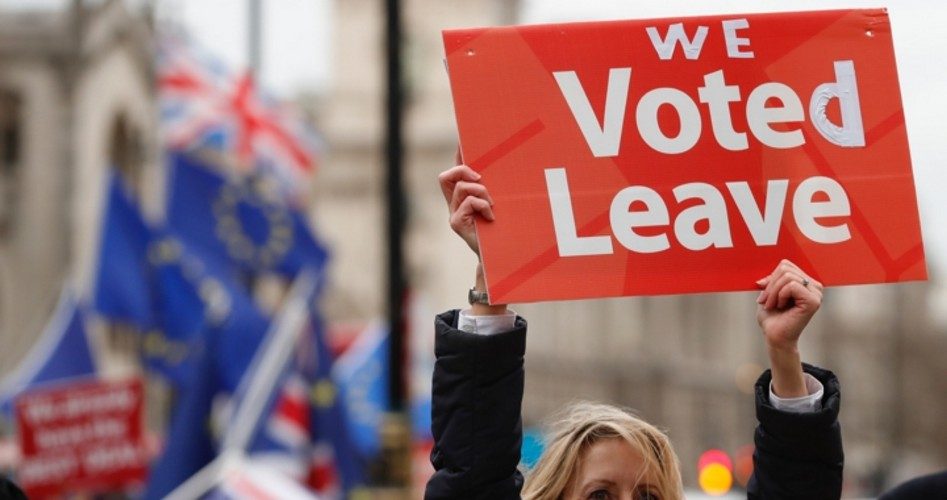
With the March 29 deadline for Great Britain to leave the European Union looming, preparations for a possible “no deal” Brexit have begun. One hundred days now remain until the U.K. is scheduled sever its ties with the EU.
The vote on May’s Chequers Plan — which many hardline Brexiteers refer to as a “soft Brexit” — has been delayed until January as members of Parliament (MPs) have now recessed for the Christmas holiday. Debate on the plan will begin again during the week of January 7 with the vote expected during the week of January 14.
May’s plan does not have widespread support and, unless a political miracle materializes, it is expected to be voted down. Should that happen, the U.K. is in a precarious situation. Without a deal moving forward, many are predicting economic upheaval, which some say could include grounded flights to and from Europe, chaos at ports, and even possible food shortages.
“I think no-deal would be absolutely catastrophic for this country,” said Attorney General and Conservative MP Dominic Grieve last summer. “We’ve got to be realistic about this. We will be in a state of emergency. Basic services which you take for granted might not be available.”
A spokesman for Theresa May said, “Cabinet agreed that with just over three months from our exit from the EU, we have now reached the point where we need to ramp up these preparations. This means we will now set in motion the remaining elements of our no-deal plans.”
Troops have been put on standby to assist the government in the event of disruption. Cabinet ministers have also reserved ferry space for supplies. Defense Secretary Gavin Williamson stated that his department “will have 3,500 service personnel held at readiness, including regulars and reserves, in order to support any government department on any contingencies they may need.”
Number 10 Downing Street has also promised to send advice on prepping for a “no deal” Brexit to businesses, suggesting that they should begin preparing for that scenario.
The EU is also looking ahead to a possible “no deal” Brexit, announcing certain contingency plans. But the European Commission concedes that these are simply stop-gap measures and not intended as a permanent solution. “These measures will not — and cannot — mitigate the overall impact of a “no-deal” scenario,” the European Commission said in a statement.
Among the no-deal steps being taken by the EU are allowing flights to and from the U.K. to overfly the EU for one year to maintain “basic connectivity; allowing freight haulers from the UK into the EU for nine months without having to apply for permits and recognizing UK financial regulations in certain areas, such as derivatives trading as equivalent to the EU’s for one to two years.”
The European Commission is also urging the 27 remaining member nations of the EU to take a “generous” approach to the residency rights of U.K. citizens residing in the EU, “provided that this approach is reciprocated by the U.K.”
With the future so uncertain, and many pundits predicting economic chaos in the event of a “no-deal” Brexit, many U.K. citizens are hedging their bets and delaying major financial decisions until the picture becomes clearer.
Tom Clarkson of the polling group BritainThinks believes a national angst is setting in as the March 29 deadline approaches. “There’s an overall mood of pessimism at the moment,” Clarkson said. “Brexit is the worst kind of politics. It’s very Punch and Judy. It’s the kind of Westminster politics that people hate.”
As pessimism grows in the U.K., calls for a new vote on Brexit are becoming louder. London Mayor Sadiq Khan has been very vocal about a new referendum, saying, “My point is this. Rather than having a bad deal or a no-deal, let’s put that to the British public with the option of staying in the EU.” Khan, a Muslim who has opposed leaving the EU from the beginning, failed to mention the fact that the “British public” was already given “the option of staying in the EU.” The “British public” voted to leave.
Some in May’s government are still holding out hope that the deal she negotiated will somehow pass the divided House of Commons. Work and Pensions Secretary Amber Rudd, a close associate of May, believes that it’s prudent to make preparations for a possible “no-deal” situation, and that it’s not wise to simply give up on May’s deal. “Just because you put a seatbelt on doesn’t mean you should crash the car,” Rudd said.
But May’s Chequer’s plan is a vehicle with three flat tires, a gas leak, and an engine fire. It simply does not have the support of either side, so it’s bound to crash.
As frightening as the specter of a “no-deal” Brexit seems, it is still a better option that remaining in the EU and under the thumb of the unelected bureaucracy in Brussels that runs it. Besides, globalists in Europe, Great Britain, and the news media are making a “no-deal” Brexit sound a lot worse than it will actually be. The main issue for U.K. citizens two years ago was sovereignty, and a sovereign Britain not constrained by the EU will be able to negotiate commerce and trade on its own terms. Besides, it’s doubtful that the EU bureaucrats will really “cut off their noses to spite their faces,” as Brexit campaigner and former UKIP leader Nigel Farage alluded to after the 2016 Brexit referendum. The EU will want British goods and services, and vice-versa. Europeans will not let Europe collapse the morning after a no-deal Brexit.
Photo: AP Images



